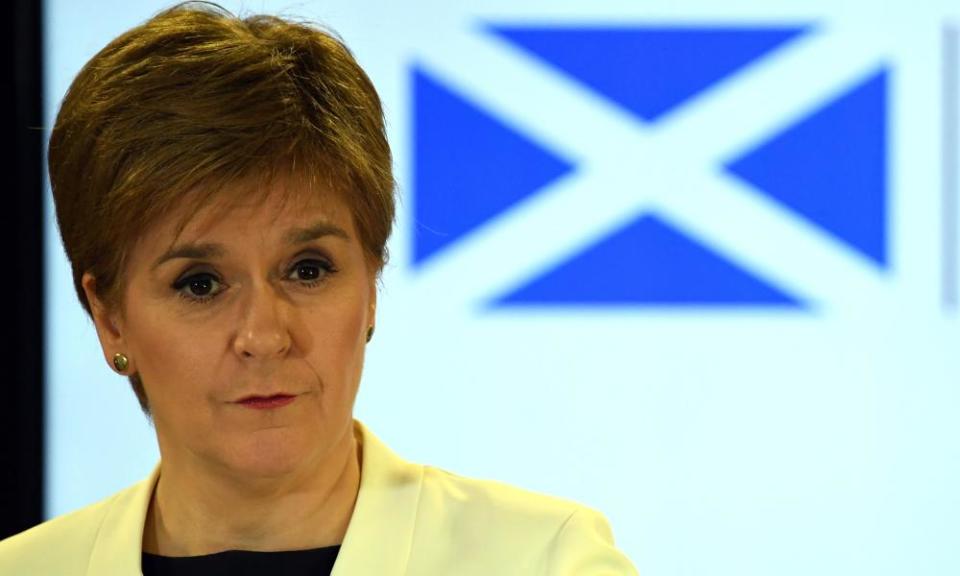How the Covid crisis is changing minds on Scottish independence

It was at the height of Scotland’s lockdown that it struck Henry most profoundly that the union was obsolete. A traditional Labour voter in his late 40s from a unionist family, he watched as the disorienting, dumbfounding news of the pandemic scrolled across his TV screen and realised that the bonds of the UK seemed “no longer fit for purpose”.
As the crisis progressed, Henry says, he was “appalled by the arrogance of the Westminster elite, in particular the behaviour of Dominic Cummings”. He compares this to the conduct of Scotland’s first minister, Nicola Sturgeon. “I’ve never been a supporter of the SNP or a massive advocate for Sturgeon, but when she appeared on those daily briefings there was an honesty that shone through. I’m not naive, I know how politicians operate, but I felt she showed a down-to-earth empathy.” He also felt Sturgeon, unlike Boris Johnson, was in command of the situation.
Henry is no nationalist convert, and indeed he declares it a “certainty” that he would not vote for the SNP in an independent Scotland. But he will now vote for that state to come into being. “And the reason I’d vote yes is because I really feel it’s time we moved on.”
In part this is because he feels constitutional matters have dominated the political agenda in Scotland for too long. As a teacher, he knows there are other issues that deserve attention. “But other parties can’t escape the shadow of independence, so let’s see what’s next.”
It’s partly bluff-calling, to see what the SNP comes up with when it can no longer blame Westminster. “Independence scares me,” he admits, “but the current political stagnation is worse.”
YouGov polling for the Times last month put support for independence at 53%, up two points from January, excluding “don’t knows”, and in August a Panelbase survey for Business for Scotland found 45% answered no to the question “should Scotland be an independent country?”, reversing the result of the 2014 referendum.
The rise in support for independence is an old story, quips John Curtice, the veteran analyst and professor of politics at Strathclyde University, before acknowledging that although a four-point lead may not qualify as a surge, this is the first time in Scottish polling history that yes has been consistently ahead over an extended period of time.
It may be some way off the convincing proportions that many in the pro-independence camp believe they must secure to avoid Brexit-style division, but it’s nonetheless reportedly caused concern around the Westminster cabinet table. Not least because, as Curtice explains, the character of those who have switched over the past six months is different to those who were prompted to reconsider independence after the 2016 EU referendum. “This is no longer a Brexit story,” he says.
After the Brexit vote, there was some counterbalance between Scots who voted remain and then moved from no to yes on independence, and those disenchanted leave voters who abandoned their nationalist sympathies. With so many more remain voters in Scotland, the arithmetic took the country to 50/50 by January, says Curtice. “But since then the increase in support for independence has occurred amongst remain and leave voters.”
He explains: “Firstly, coronavirus is the most important public policy that devolution has had to deal with since 1999. Two, there’s an enormous difference in public perception of how well the Scottish and the UK government have been handling it: 70-75% think Nicola Sturgeon is doing brilliantly, it’s almost the opposite for Boris, and crucially this is not just yes voters saying: ‘Nicola walks on water.’
“Three, there are a couple of polls asking: ‘Do you think that the coronavirus would have been handled better or worse if Scotland was an independent country?’ The crucial contrast is only 4% of those who voted yes in 2014 think it would have been handled worse under independence, while 20% of those who voted no say it would have been handled better.”
Speaking to those who have changed their minds over the past six months, as well as the activists greeting them at virtual yes hubs, it is striking how often Sturgeon’s daily briefings are mentioned. On Thursday [Sept 10] the BBC announced it was stopping its live TV broadcasts of the briefings, prompting a furious row and accusations that the corporation was capitulating to unionist demands to halt the “SNP party political broadcasts”.

As Maggie Lennon, from the non-aligned Women for Independence, puts it: “Women who voted no because they felt they weren’t getting enough information, especially on the economy, now have seen a woman prepared to stand up every day and answer questions.”
The change in demographic profile of those moving to yes has been ongoing since 2016, says Ailsa Henderson, a professor of political science at Edinburgh University and head of the Scottish Election Study. “Women are over-represented, in particular having voted remain, while the age of yes supporters has crept upwards. Most recent polling found that a third of Labour voters would vote yes.”
Henderson points out that the perception that the SNP government is competent is not new, but what is different about the pandemic is that the UK and Scottish government are comparable on exactly the same issue, as events are unfolding. “The policy difference may not be that striking, but the management has been very different.”
Likewise, people’s understanding of risk has fundamentally shifted. “Those with a greater appetite for risk were more likely to vote yes in 2014, but if the status quo doesn’t seem to be much of a safe haven, that risk argument can’t be run in a similar way.”
For Donald Macpherson, a semi-retired former CEO of a large manufacturing company, living in Edinburgh, the move to yes has been an incremental process. Though his upbringing was “unionist to the core” – his father was an army chaplain – he says he has been “uneasy for some time about the growing gap between Scottish and UK politics”.
It is the practical lessons from the pandemic that have consolidated his views on independence. “I do think it has helped me and others to see this is positive proof that independence could work,” he says.
“I’m pretty confirmed now. What I’ve seen of how Scotland can cope under pressure has only tipped me further towards independence.”
* Some names have been changed

 Yahoo News
Yahoo News 
